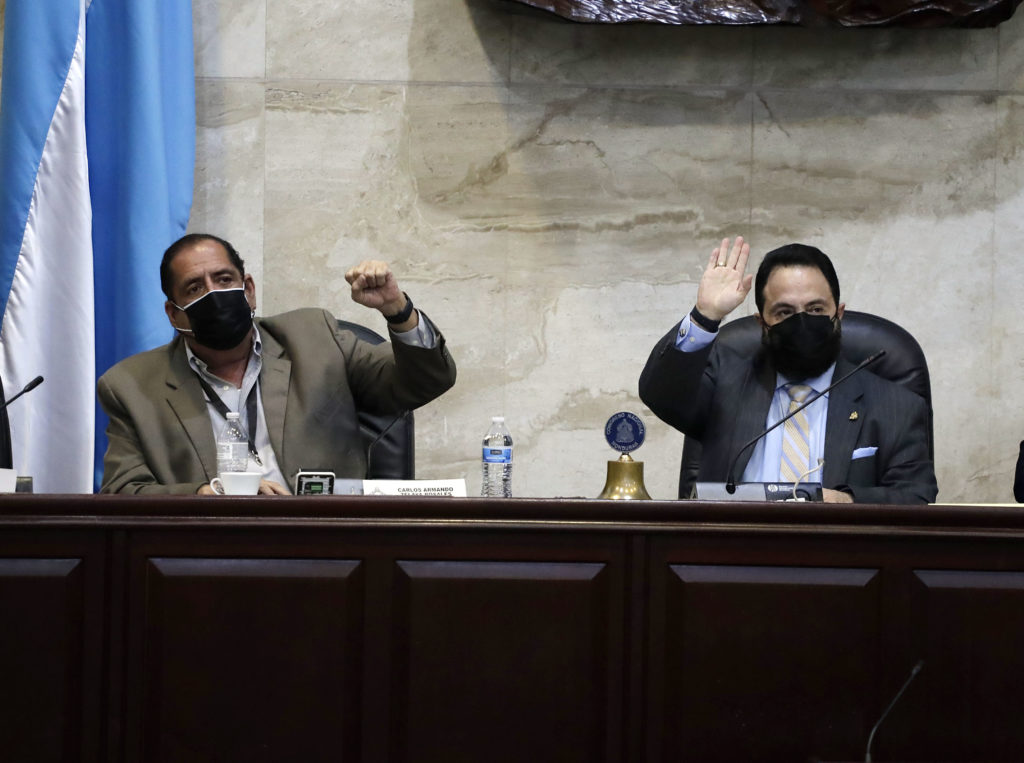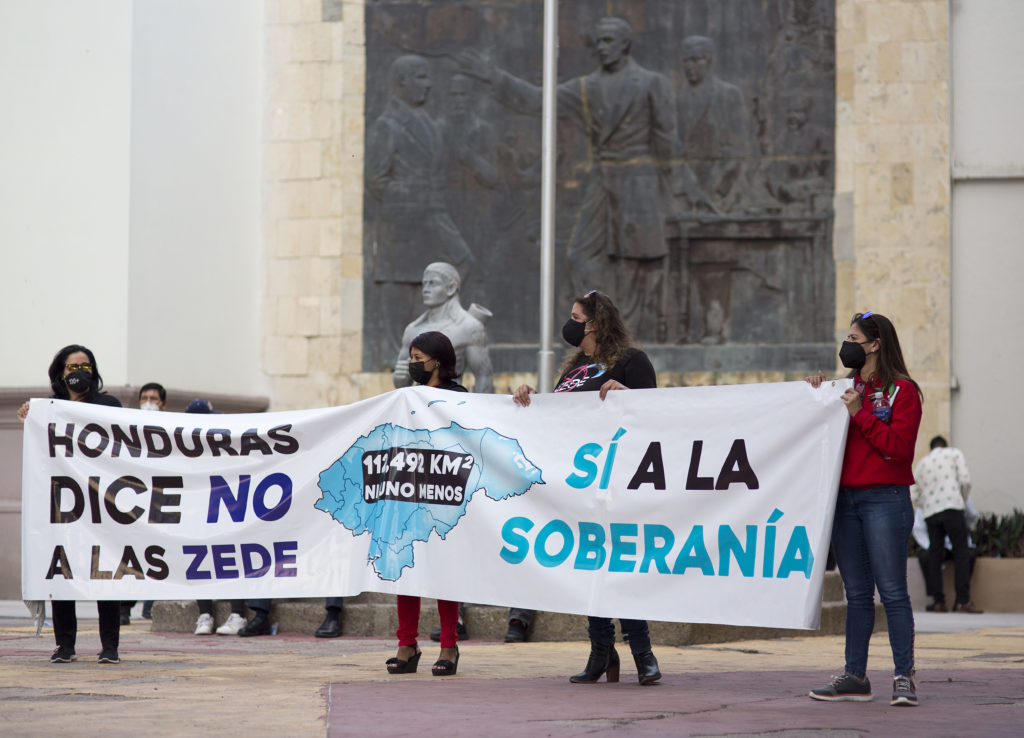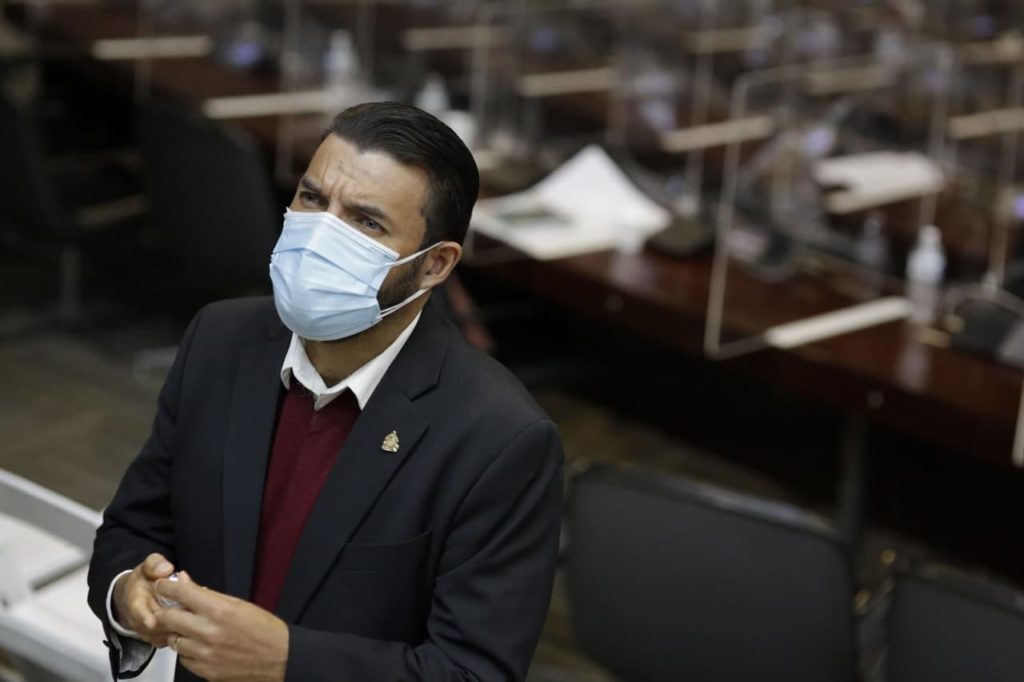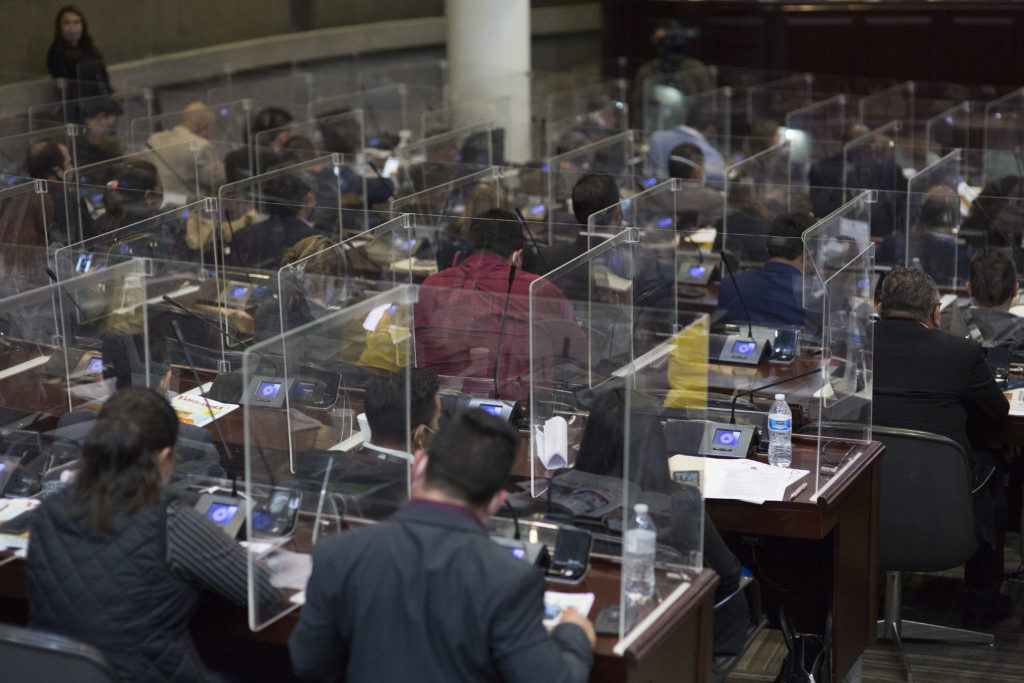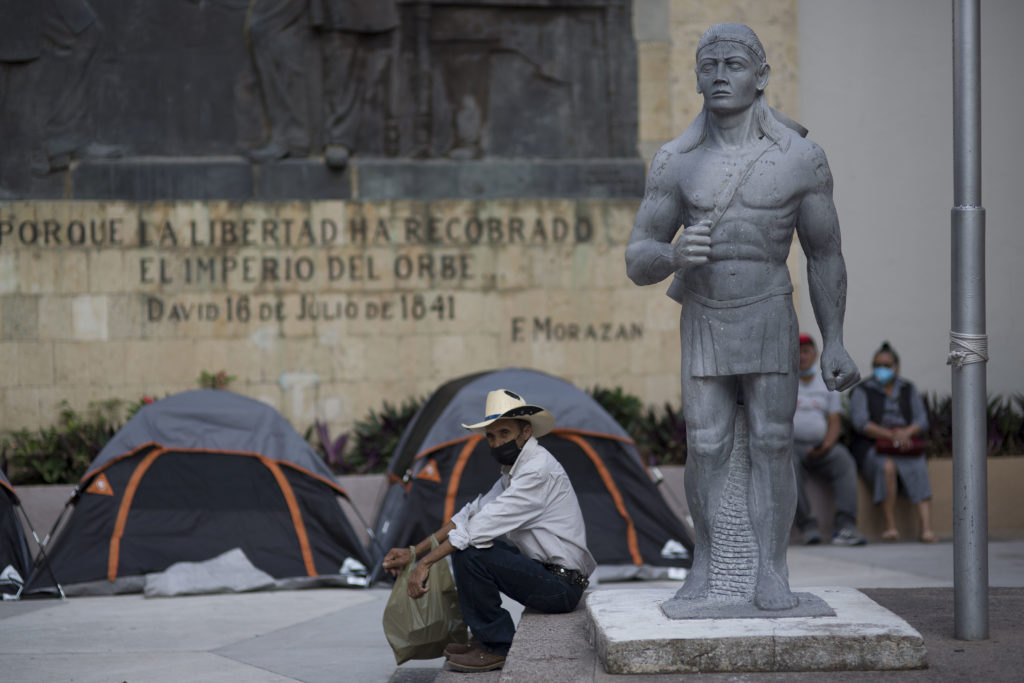Legislators from the faction supporting Luis Redondo as president of the National Congress met on February 2 to vote on several laws that fulfill some of President Xiomara Castro’s campaign promises. A law proposed by Representative Rasel Tomé condemning the coup that deposed Manuel Zelaya 12 years earlier was approved, and includes amnesty provisions for those that defend national sovereignty, land and water sources. It also protects public officials from prosecution for corruption-related crimes committed from 2006 to 2009.
By Fernando Silva
Photos by Jorge Cabrera
Even though Honduras’ congress is still without a legal board of directors, the Libre Party and Salvation Party legislators who elected Luis Redondo as president of that body convened on February 1 and 2 in the legislative chambers, completely ignoring the absence of 43 representatives from the National Party, 14 from the Liberal Party, and 17 dissident representatives from the Libre Party.
Competing boards of directors of the National Congress were sworn in on January 23 in Honduras. For a full explanation, read our coverage here.
Foregoing the normal roll call, the legislators began the session with a prayer and discussed several proposed laws, including two submitted by the executive branch. The proposed laws were approved during a February 2 session in which Redondo announced that two alternate representatives from the Liberal Party were present, substituting for Mauricio Villeda and José Rosario Tejeda.
The first law proposed by the presidency was approved in the plenary session and amends the General Law of the Electricity Industry to provide free electricity to the 1,335,000 households that consume less than 150 kilowatt hours per month. The next law approved was an amendment to the law that mandates funding for social programs and national patrimony conservation. The amendment will effectively lower fuel prices by US$0.40 per liter.
A law proposed by Representative Rasel Tomé condemning the 2009 coup was approved later in the session. It repeals Decree 141-2009 issued in 2009 by the National Congress to remove then-president Manuel Zelaya from office, and officially named a public square for Isis Obed Murillo, the first protestor killed in the aftermath of the coup. It also authorizes President Castro to sign an agreement creating an international commission against impunity and corruption.
The law sponsored by Tomé includes a provision that mandates the release of political prisoners, as well as amnesty for people currently in politically motivated legal proceedings and public officials that served in Zelaya’s administration from 2006-2009. This provision does not require the creation of an independent entity to determine which public officials qualify for amnesty.
Tomé claimed on February 1 that he could apply for amnesty himself since he was one of the public officials persecuted after the coup. In 2019, a court sentenced three former commissioners of the National Telecommunications Commission (Comisión Nacional de Telecomunicaciones – CONATEL), including Rasel Tomé, to three years in prison for abuses of authority committed during the Zelaya administration from 2006-2009.
The amnesty law and impunity
After the February 1 legislative session, Rasel Tomé made statements to the press declaring that the Committee of Relatives of the Detained and Disappeared in Honduras (Comité de Familiares Detenidos-Desaparecidos en Honduras – COFADEH), will be responsible for identifying the imprisoned social activists who may apply for amnesty. However, he did not clarify which public officials could apply, nor who will evaluate their cases. Tomé said, “It’s well known which public officials have been persecuted. Everyone knows who has spent the last 12 years challenging the dictatorship. Some people like me had to leave the country─ I was in exile in the Dominican Republic.”
From 2006-2008, Rasel Tomé was a CONATEL commissioner appointed by Zelaya, whom he followed into exile after the coup. Tomé has since clashed publicly with Zelaya over the leadership of the Libre Party. In June 2019, Tomé was sentenced to three years in prison for abuses of authority at CONATEL. The sentence is commutable, but it disqualifies Tomé from holding public office. The sentence was upheld by the Supreme Court of Justice in a letter sent to the National Congress on January 31, 2021.
Attorney Obed López, Tomé’s alternate in the National Congress, claims that the sentence does not apply to Tomé, and that, “He was only disqualified from serving as a CONATEL commissioner again. Moreover, he is not a civil servant, but a representative of the people elected to Congress.” Article 3 of the Code of Ethics for Civil Servants contradicts López, defining a civil servant (or official) as anyone who works in the executive, legislative, judicial or municipal branches of government, among others.
The new amnesty law covers crimes such as the corrupt acts for which Tomé was sentenced, including abuse of authority, violation of the duties of public officials, embezzlement of public funds, fraud against the government, illegal enrichment, and more.
Contracorriente asked Tomé to name other officials that could apply for this amnesty, but he only replied, “Quite a few public officials who have been in exile abroad since the coup [could apply].”
Other officials who faced legal proceedings for corruption while serving in the Zelaya administration include Marcelo Chimirri, President Castro’s nephew, who was convicted of illegal enrichment as manager of the Honduran Telecommunications Company (HONDUTEL) from 2006-2007 and is currently serving a prison sentence. Former presidential minister Enrique Flores Lanza was accused by the Ministry of Justice of embezzling public funds and is a fugitive from justice abroad.
In his statement before the plenary session, Tomé said that the victims of the coup “aren’t the only martyrs,” adding that many families have been forced to leave the country. One day they were honorable public officials, and the next, “they became outcasts─ persecuted and stigmatized as thieves, white-collar criminals, and looters. These were officials of our constitutional government working hard at their jobs every day.”
“Why doesn’t anyone talk about the humiliating harm done to my colleague and friend, Enrique Flores Lanza? This is a man whose family has been shattered, demonized, and oppressed. I know what exile is like and that’s why I’m talking about this,” said Tomé. “Today, we are fearlessly saying that this amnesty will offer restitution for the damage done by the despicable coup that has dragged us down for 12 years.”
In an interview with Contracorriente, Lester Ramirez, director of governance and transparency for ASJ Honduras (Association for a More Just Society), noted that another amnesty had already been decreed for those involved in the 2009 coup. It covers Manuel Zelaya’s alleged violation of the constitution for trying to conduct a national referendum that would have paved the way for his reelection, as well as the military officials who carried out the coup. The amnesty decree was approved by the National Congress on January 27, 2010, and did not include corruption-related crimes. “I don’t know why they call this a law that condemns the coup if an amnesty already exists for those involved,” said Ramirez.
Regarding others that benefit from this amnesty, such as environmental activists and social protestors, Ramírez notes that these activities are unrelated to the coup and are instead the result of social conflict. While he does believe that people convicted of these offenses should have their cases reviewed, the language in the new amnesty law does not address their circumstances.
One case that could be resolved by applying this new law is the Guapinol River case in which the defendants just completed 29 months in preventive detention last week for the alleged crimes of aggravated arson and illegal deprivation of liberty. Porfirio Cedillo, José Cedillo, Orbin Hernández, Kelvin Romero, Arnold Alemán, Ewer Cedillo, Daniel Márquez, and Jeremías Martínez, are being prosecuted for protesting by the Inversiones Los Pinares mining company that jeopardize community water sources in the Carlos Escaleras National Park. The oral arguments and public phase of this trial concluded on February 4.
The legal representatives of the defendants in the Guapinol River case were not informed of the amnesty law before its approval, so attorney Edy Tabora said that they would have to carefully review its content to understand the requirements that must be met for amnesty to be granted.
Ramírez says that amnesty processes normally happen after a truth commission and reconciliation process that leads to restorative justice. This law “is limited to eliminating any form of criminal prosecution,” he says. “The amnesty falls short because there is no reconciliation, there is no revelation of the truth behind the events, and there are no reparations for the victims─ these are all holes in the amnesty process,” said Ramírez. “There will be no national reconciliation─ what we now have is a pardon more than an amnesty.”
Ramírez points out that the biggest missing piece in this law is the lack of an independent commission to analyze each amnesty case. “What’s needed is an amnesty commission that can review the files and assess whether people being investigated or criminally prosecuted are covered by the amnesty,”
There was no debate on the overall law in the legislative chambers, but when approval of the specific amnesty provision was underway, Representative Ligia Ramos of the Salvador Party of Honduras (PSH), requested that a commission from the United Nations High Commissioner for Human Rights (OHCHR) be formed to determine which cases could apply for amnesty under this law. In the plenary session, Ramos said, “The spirit of this provision is to free political prisoners from prison and allow exiles to return home. This provision should never be used to provide impunity to any criminal.”
Representative Silvia Ayala of the Libre Party, who led the congressional committee that submitted the new law for consideration by the National Congress, dismissed Ramos’ request, saying, “Considering the agility that is needed, the responsible government entity will be the Ministry of Human Rights with collaboration by COFADEH.”
The Ministry of Justice and the court system have not yet issued any statements regarding the legal proceedings that would have to be canceled as a result of this amnesty, largely because they have not legally recognized Luis Redondo’s leadership of the National Congress. On January 25, the courts presented their most recent achievement report to the National Congress faction led by Jorge Cálix, whose election as president of that body was also riddled with disqualifying factors, according to experts.
The vote on the law with the amnesty provisions was by a show of hands, and it was later announced that the law had been approved unanimously. However, no official records of the regular and alternate representatives who attended this session are available.
Appointments by a legislature without a quorum
It was almost midnight by the time the law with the amnesty provisions was approved. The session had been formally closed when the appointments of the attorney general and deputy attorney general were proposed. Within minutes, a new session was initiated and the appointments of Manuel Antonio Díaz Galeas and Tomás Andrade were submitted to a vote and approved. Manuel Díaz, who served as the secretary-general of the Electoral Justice Tribunal (Tribunal de Justicia Electoral – TJE) until December 2021, was confirmed as attorney general. Tomás Andrade, the new deputy attorney general, had previously worked as a human rights defense attorney
The board of directors of this congressional faction first attempted to appoint Galeas and Andrade on January 27, but the vote was postponed when Ramón Enrique Barrios protested that there was insufficient information available about the professional background and experience of the nominees.
Barrios told Contracorriente that the appointment of these high-level officials was not on the agenda and that he has expressed to congress and the general public that these officials should be selected based on an open, competitive process. A few hours after his suggestion was rejected, Barrios said, “I would like to have 20 or 30 [candidate] resumes. An attorney general is a top-level public official and the appointment cannot be taken lightly, it seems to me.”
After Diaz and Andrade were appointed, Tomas Zambrano, leader of the National Party congressional caucus, issued a press release declaring that the two men do not have the professional credentials required by the constitution, since neither one is a notary public. He also noted that the current attorney general, Lidia Cardona, doesn’t complete her term until June of this year; another reason why the new officials should not have been appointed.
Almost two weeks after the conflict in the National Congress began, Luis Redondo has taken control of the legislature’s administrative resources and announced that their next step will be the repeal of the private corporate towns, formally known as Employment and Economic Development Zones (Zonas de Empleo y Desarrollo Económico – ZEDE). Laws are now being created and repealed with only 53 congressional representatives attending the sessions, 12 fewer than required for such activities to be considered legal.

